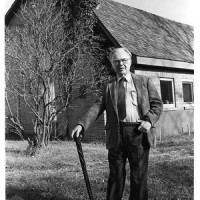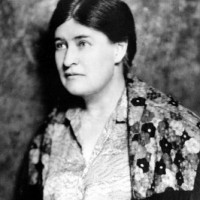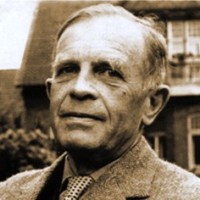E il mito si fece carne. L’avventura di Russell Kirk, by Marco Respinti.
Il logos si è fatto carne, dice il Vangelo secondo san Giovanni. E quindi anche il mito è divenuto un fatto, glossa C.S. Lewis (1898-1963) in un breve, densissimo saggio del 1944, Myth Became Fact, che spiega perfettamente cosa intendesse J.R.R. Tolkien (1892-1973) affermando: «Dio è il Signore, degli angeli, e degli uomini – e degli elfi. […] L’Evangelium non ha abrogato le leggende; le ha santificate, specialmente nel “lieto fine”» (Sulle fiabe, 1939); cosa intendesse Gilbert K. Chesterton (1874-1936) ‒ maestro di Lewis e di Tolkien ‒ parlando di “etica del paese delle fate” e addirittura paragonando il Magnificat alla fiaba di Cenerentola (Ortodossia, 1908); e cosa intendessero Chesterton e Lewis con “sacramentalizzazione dell’immaginazione” a proposito di George MacDonald (1824-1905), maestro loro e pure di Tolkien.
Ne tratta dottamente, proprio ragionando degli autori citati, il cardinal Christoph Schönborn ne Il Mistero dell’Incarnazione (Piemme, Milano 1989), un “vecchio”, prezioso libro tradotto dal tedesco dal padre gesuita Guido Sommavilla (1920-2007), massimo esperto di Romano Guardini, Franz Kafka, Friedrich Nietzsche, Fëdor M. Dostoevskij e guarda caso proprio Tolkien, quasi anticipando una sensibilità teologica, nutrita di potenti suggestioni letterarie, popolare oggi con Papa Francesco. Ebbene, uno degli ultimi epigoni di questo sposalizio tra filosofia e fantasia celebrato secondo il rito di santa romana Chiesa è il pensatore statunitense Russell Kirk (1918-1994), di cui ricorre oggi, 29 aprile, il ventennale della scomparsa.
Kirk è noto soprattutto come “padre” del conservatorismo americano del secondo Novecento, come neo-giusnaturalista cristiano alla scuola di Edmund Burke (1729-1797) e come apologeta antigiacobino della storia istituzionale americana. Ma nulla di tutta la sua riflessione “politica” (30 volumi, centinaia fra saggi e articoli) sarebbe venuto alla luce se egli non avesse sempre coltivato, con timore e tremore, il senso del mistero insito nella realtà umana.
Kirk è stato infatti anzitutto un cantore dell’irriducibilità dell’esperienza umana alla semplice materia (una delle sue citazioni preferite è di Burke, là dove lo statista anglo-irlandese descriveva così la spaccatura epocale introdotta dalla Rivoluzione Francese: «Ma l’era della cavalleria è finita. Le è succeduta quella dei sofisti, degli economisti e dei calcolatori, e la gloria d’Europa è estinta per sempre»), e proprio per questo un avversario lucido delle ideologie e delle ideocrazie.
Per Kirk la stoffa dell’avventura umana è il legame con il trascendente che la definisce e il bisogno religioso che la costituisce, da cui derivano quel senso del limite e quella vocazione comunitaria che sono le uniche coordinate di una politica a misura di uomo, e possibilmente, direbbe san Giovanni Paolo II (a cui, in punto di morte, è andato l’ultimo pensiero di Kirk), secondo il piano di Dio. Per questo il pensatore americano sospettava di tutte quelle ciclopiche costruzioni umane, fisiche e metafisiche, che altro non sono se non ennesime Babeli; come Chesterton, Kirk aveva imparato dalle metafore delle favole che i giganti vanno abbattuti proprio perché sono giganteschi, monumenti vani alla smisuratezza dell’orgoglio umano.
La famiglia in cui nacque aveva educato Kirk a una morale rigida e spartana, erede di un retaggio calvinista che strada facendo aveva però perso i tratti della vera spiritualità riducendosi a un codice. Efficace, ma estremamente limitato. Costretto a lungo alla solitudine, Kirk prese allora a confrontarsi con quei campioni dell’umano sentire che prima di lui, e meglio di lui, si erano trovati ad affrontare le stranezze, le difficoltà e le domande dell’esistenza. Maturò dunque dialogando con autori che nessuno leggeva più: Kirk l’ha definita una “conversione intellettuale”, ma è strano perché quell’etichetta lo irritava. Voleva solo dire che nessun fatto eclatante gli stravolse un giorno la vita; ma anche qui, intendiamoci. Le molte narrazioni della sua storia personale (scritte come romanzi non romanzati) mostrano bene come la “normalità” della sua vita sia sempre stata “straordinaria”. Come le vite di tutti. Come in una favola, una fiaba o un mito (direbbe il Tolkien che Kirk molto amava) che per di più hanno il supremo vantaggio di essere accaduti sul serio.
Kirk ha affrontato de visu il mistero dell’esistenza umana anzitutto come cantore dell’avventura “mitica” dell’uomo di fronte all’Assoluto (componendo così anche storie di paura e thriller metafisici tra i più belli di questo genere letterario) e in questo modo ha imparato l’umile saggezza di farsi seguace di chi, più avanti di lui lungo questo cammino, lo ha saputo trarre per mano dal mito alla storia. Due nomi su tutti, appositamente diversissimi: il “grande” T.S. Eliot (1898-1965) ‒ di cui fu prima discepolo, e poi amico e biografo ‒ e Annette, l’“attivista” cattolica che sposerà nel 1964, “piccola” parrebbe, ma enorme nel portarne a conclusione la conversione, avvenuta in quello stesso 1964 (mezzo secolo fa esatto).
Read the complete article in La Nuova Bussola Quotidiana
The Christian Humanism of Willa Cather, by Bradley J. Birzer
On Sunday, August 11, 2013, my family and I began our now-yearly odyssey into the West. As I write this, our vacation is ending, and I’m typing this from the second floor of a rented house in the Rockies, looking across my laptop out the window at Mt. Ouray.
In two days, our kids have pre-opening at their academy, back in Michigan, and the next morning I’ll attend the same for my job. I’m not quite ready to leave the glories of the American West, but, should I continue to care about a steady income and providing for my family, eastward I must return.
Some of my very first posts at The Imaginative Conservative were written three years ago on such a trek. I can no longer embark on annual trips without thinking of The Imaginative Conservative and without considering editorial mastermind Winston Elliott’s birthday (August 13), a day that will be celebrated some day in the Republic of Texas and, if it still exists, the United States of America.
A significant part of our yearly ritual and travel is my wife reading fiction to me as I drive. Dedra has one of the best reading voices I’ve ever encountered, and, as long as my children aren’t fighting with one another or with imaginary friends, I look forward to her reading almost as much as I look forward to the sites I’m about to encounter on our adventures.
Dedra can read anything and read it well, but she most often gravitates either to the mysteries of Ralph McInerny and Sharon McCrumb or to the fiction of Willa Cather. We both have adored Cather since college. With The Imaginative Conservative’s beloved John Willson, I try to read Death Comes for the Archbishop at least once year. I think a solid case could be argued for considering this novel the “Great American Novel” if such a label needs to be employed. Cather’s West is what the American West should’ve been, rather than what it was. In Cather’s vision, the West is humane, challenging, and, ultimately, in the best Ciceronian sense, cosmopolitan.
Cather’s life
Looking back a century and a half, it would probably not have been wise to have bet on the success of Cather. Born in Virginia, her parents moved her to extreme south central Nebraska (only miles from the Kansas line and only about fifteen miles from the geographic center of the 48 states). Oldest of seven children, her parents homeschooled (or its past equivalent) Willa with their neighbors, raising her around German, Polish, Bohemian, Moravian, Swedish, and Russian immigrants. American Indians arrived in Red Cloud from time to time, as did Americans of African descent. All of this immigration and community with the treeless backdrop of the Great Plains fascinated Cather. Here, as a young woman, she experienced what most sociologists only imagine in their wildest dreams. While the various peoples and peopling of the land mattered to Cather, so too did the land.
Then the Genius of the Divide, the great, free spirit which breathes across it, must have bent lower than it ever bent to a human will before. The history of every country begins in the heart of a man or a woman.
So wrote Cather of her first great heroine, Alexandra, in O Pioneers!.
Graduating from the University of Nebraska in Lincoln in 1895, Cather went east to work as a muck-racking journalist. She gained considerable attention and fame at the notorious but popular McClures and she gave herself fulltime to her fiction in 1912. Her many works include: April Twilights (1903); Alexander’s Bridge (1912); O Pioneers! (1913); The Song of the Lark (1915); My Ántonia (1918); Youth and the Bright Medusa (1920); One of Ours (1922; for which she won the Pulitizer Prize); A Lost Lady (1923); The Professor’s House (1925); My Mortal Enemy (1926); Death Comes to the Archbishop (1927); Shadows on the Rock (1931); Obscure Destinies (1932); and Lucy Gayheart (1935).
Sometime in the 1920s, Cather’s anti-progressive views became quite clear, and the left despised her. She died, horribly, in some literary obscurity, rescued only after her death.
Read the complete article in The Imaginative Conservative
Wilhelm Roepke: German Economist as Southern Neighbor, by Ralph E. Ancil
How can a German economist be called a Southerner? Obviously not geographically but in the important sense that Southern Agrarians came to understand, as a possession of the mind and spirit. That Wilhelm Roepke’s mind and spirit, embodying the best of the German tradition, share significantly in the essential features of the Southern heritage is not too surprising when it is recalled that Southern culture itself was essentially European.
In evidence of this there are some suggestive comparisons that can be made here. For example, Richard Weaver went home in spring to farm his ancestral fields with horse and plow and refused the use of airplanes, preferring trains for long distance travel. Similarly, Roepke promoted urban gardening for the health of city-dwellers and refused to use ski-lifts, preferring to ride up the mountain slopes on shank’s mare. Or one may refer to the Southern fondness for the books of Sir Walter Scott whose stories of Saxon yeomen fighting Norman invaders parallels those of William Tell fighting Austrian conquerors as eulogized in Schiller’s famous poem, admired by Roepke. Then one may conjecture about the influence of Germans and Lutherans on Southern life. Certainly, Luther himself was a social medievalist and agrarian and longed for the non-commercial life of an earlier time. To what extent this affected Southern life is arguable as is the effect of his Lutheran faith on Roepke’s outlook. But the parallels are thought-provoking.
Read the complete article in The Imaginative Conservative


